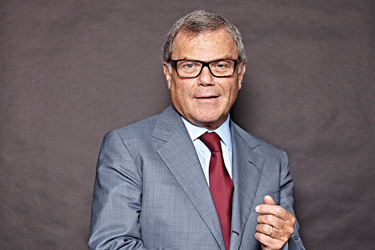
One third of WPP shareholders voted against chief executive Sir Martin Sorrell’s £70m pay at the annual general meeting on Wednesday.
Over 33% opposed the remuneration report and just under 67% were in favour.
There were some abstentions as shareholders showed disapproval by withholding their votes. Taking those abstentions into account, more than 34% failed to back the remuneration report.
It was the worst revolt at a WPP AGM since 2012.
Investors were unhappy that Sorrell collected £63m from a five-year incentive plan, called LEAP, even though the company has agreed to stop the controversial scheme in future years.
WPP axed LEAP after 60% voted against his pay in 2012 in one of the biggest rebellions at a FTSE100 company – even though shareholders had approved the bonus scheme when it was set up in 2009.
LEAP still has one more year to run. His £63m bonus was based on an award made in 2011.
The new chairman, Roberto Quarta, faced a barrage of questions at the meeting about succession planning for Sir Martin and his £70m pay from investors, including Hermes EOS, Standard Life, the Railways Pension Scheme, Share Action, Share Soc and the UK Shareholders’ Society.
Hans-Christophe Hirt, an executive director Hermes EOS, a significant investor in WPP, warned of “succession risk” because Sir Martin is 71 and asked for “enhanced disclosure” about what plans the company is making to prepare for succession.
Quarta insisted there was “continuous and constant assessment” of suitable candidates both inside and outside the group.
Hirt also said Sorrell’s £70m package was “excessive” and Peter Parry of the UK Shareholders Society described the amount as “ridiculous”.
Roger Geary, a spokesman for Share Action, an activist charity, prompted laughter from the audience when he noted that Sorrell’s pay would take “4,394 years to earn” for someone on the Living Wage.
Quarta said shareholders have approved the bonus scheme seven years ago and no shareholder had challenged the “methodology” of the scheme.
However, Sorrell appeared to concede that LEAP looked generous “with the benefit of hindsight”.
“Having gone through Lehman Brothers, I don’t think anyone thought [at the time] WPP had the possibility of reaching a market cap of £20 billion,” he told reporters after the AGM, referring to how WPP’s share price has risen rose fivefold since 2009. “Nobody ever thought we would hit those targets.”
Sorrell indicated he did not consider giving up part of his bonus.
Quarta and Sorrell received some praise. A small shareholder, who did not give his name, described WPP’s performance as “fantastic” and dismissed “carping” about Sir Martin’s pay as “pathetic”.
Sorrell shrugged off the criticism about pay when asked if he was “fed up” with the criticism. He has always reinvested bonuses in company shares, since taking control of WPP in 1985, and has never sold any stock, except when he got divorced.
He was “not a Johnny Come Lately” who had earned share options and was going to “cut and run”, he said.
Shareholders emphatically re-elected Sir Martin as chief executive with 99.92% favour.
However, Sir John Hood, the head of the compensation committee, suffered an 8% protest vote and another non-executive director, Ruigang Li, was rejected by 30% of shareholders.
The meeting at the Pullman Hotel was decorated with Cuban images on the stage to reflect how WPP has opened an office in Havana, its 112th country.
The four global heads of WPP creative networks, Tamara Ingram of JWT, Miles Young of Ogilvy & Mather, David Sable of Y&R and James Heekin of Grey, each presented to the annual meeting.
Ingram spoke first, reflecting her importance, following the exit of Gustavo Martinez in a scandal over sexist and racist comments earlier this year.
Shares in WPP have more than doubled in value in the last five years and it has enjoyed record profits.
Here’s what Sorrell had to say about his pay packed to Campaign Middle East earlier this year.
Originally appeared in Campaign UK









